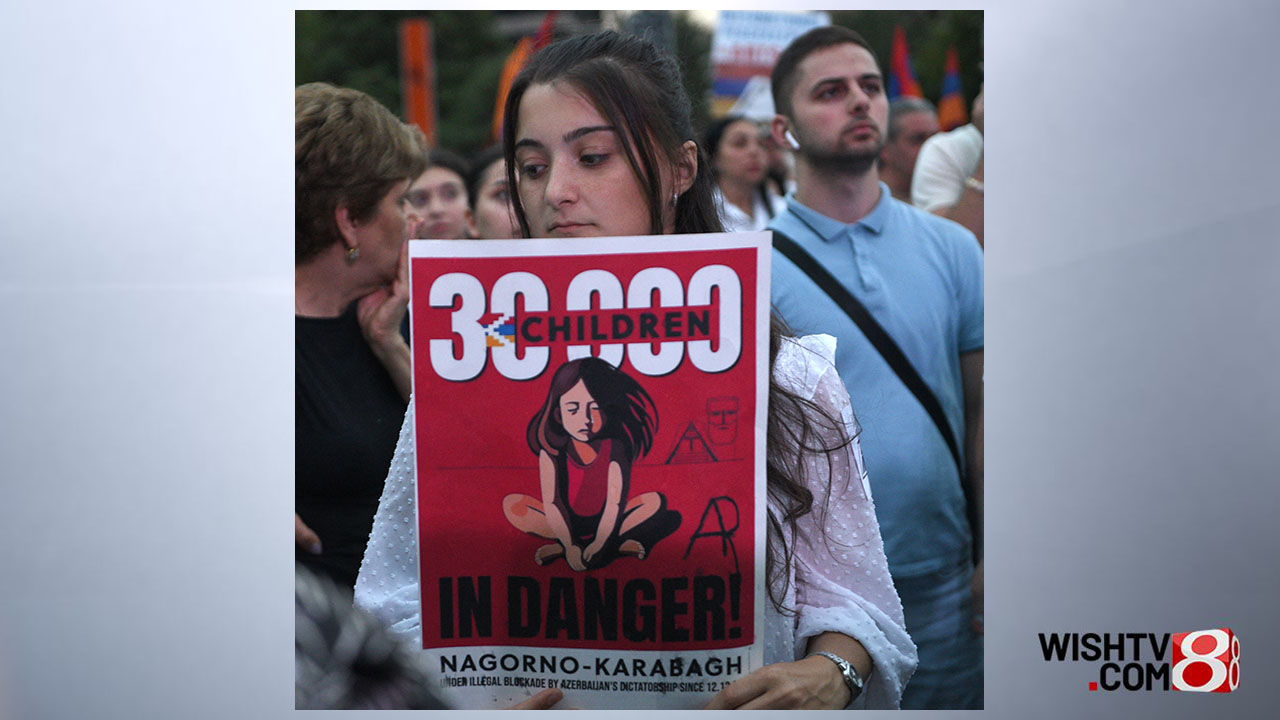Armenia, Azerbaijan clash at UN over Nagorno-Karabakh food crisis
UNITED NATIONS (AP) — Armenia and Azerbaijan clashed Wednesday at an emergency meeting of the U.N. Security Council over the plight of the 120,000 people in the Nagorno-Karabakh region that Armenia says are blockaded by Azerbaijan and facing a humanitarian crisis.
Armenia asked for the meeting saying Azerbaijan’s blockade of the Lachin Corridor, the only road connecting mainly Armenian-populated Nagorno-Karabakh to Armenia since July 15, had left its people with dwindling food, medicine and electricity.
Nagorno-Karabakh is part of Azerbaijan, but the region and substantial territory around it came under the control of ethnic Armenian forces who were backed by the Armenian military in separatist fighting that ended in 1994. Azerbaijan regained control of the surrounding territory in a six-week war with Armenia in 2020, and the Russian-brokered armistice left the Lachin Corridor as Nagorno-Karabakh’s only connection to Armenia.
At the council meeting, many countries urged Azerbaijan to immediately reopen the road, pointing to orders from the International Court of Justice, the U.N.’s highest tribunal, and all 15 nations urged Armenia and Azerbaijan to find a diplomatic solution to their nearly 30-year conflict.
The Security Council did not issue any statement but U.S. Ambassador Linda Thomas-Greenfield, who chaired the meeting, told the Associated Press afterward that “there were strong statements in the council from everyone that the Lachin Corridor needed to be reopened.” That was “the main accomplishment,” she said.
U.N. humanitarian coordinator Edem Wasornu told the council the International Committee of the Red Cross, the only international humanitarian body with access to the area, reported on July 25 that it had been unable to transport food through the Lachin Corridor since June 14 and medicine since July 7.
Wasornu said international humanitarian law requires all parties to facilitate rapid delivery of aid to all people in need, and “it is therefore critical that the ICRC’s delivery of humanitarian relief be allowed to resume through any available routes.”
Armenia’s Foreign Minister Ararat Mirzoyan told the council that as a result of the blockade, there is no economic activity in Nagorno-Karabakh, thousands of people are unemployed, stores are empty and women, children and the elderly stand in long lines to be able to buy bread, fruit and vegetables. In addition, he said, Azerbaijan has disrupted the supply of electricity through the only high voltage line between Armenia and Nagorno-Karabakh since Jan. 9.
Mirzoyan quoted a report from Luis Moreno Ocampo, the former chief prosecutor of the International Criminal Court, saying “there is a reasonable basis to believe that a genocide is being committed” as a result of the blockade.
“Starvation is the invisible genocide weapon,” he said, warning that “without immediate dramatic change this group of Armenians will be destroyed in a few weeks.”
Mirzoyan said preventing such a catastrophe is a duty of the Security Council, which is charged with ensuring international peace and security. “I do believe that this distinguished body, despite geopolitical differences, has capacity to act as genocide prevention body, and not as genocide commemoration when it might be too late,” he said.
Azerbaijan’s U.N. Ambassador Yashar Aliyev responded by “categorically rejecting all the unfounded and groundless allegations on (a) blockade or humanitarian crisis propagated by Armenia against my country.”
He accused Armenia of engaging in a “provocative and irresponsible political campaign” to undermine Azerbaijan’s sovereignty and territorial integrity, which includes Nagorno-Karabakh and the Lachin Corridor.
Aliyev said Azerbaijan installed a border checkpoint on the road to safeguard its sovereignty and security and prevent Armenia from using the route “for illegal military and other activities” including rotating its 10,000 military personnel “illegally stationed” in Azerbaijani territory, and transferring weapons and munitions as well as unlawfully extracted natural resources.
He called the genocide allegations false, saying prominent British human rights lawyer, Rodney Dixon, in a preliminary report said there is no foundation for Ocampo’s claim, citing Azerbaijan’s offer to supply good via the town of Aghdam.
Aliyev also held up what he said were photos from social media of people in Nagorno-Karabakh celebrating weddings and birthdays, saying they refute allegations about starvation and a humanitarian crisis.
Aliyev and Mirzoyan blamed each other for so-far failed diplomatic efforts.
The European Union’s deputy U.N. ambassador, Silvio Gonzato, told the council “humanitarian access must not be politicized by any actors,” and the Lachin Corridor must be reopened immediately.
“Azerbaijani authorities bear the responsibility to guarantee safety and freedom of movement along the Lachin Corridor, and to ensure the crisis does not escalate further,” he said.
